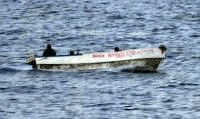The rigid-hull inflatable boat with 10 U.S. Navy sailors aboard pulled up alongside the blue-and-white dhow on the choppy, sapphire waters of the Gulf of Aden. The dhow's six occupants, dressed in sandals, loose pants and t-shirts, stood to meet the heavily armed Americans. Seeing the sailors' assault rifles, some of the dhow crewmen raised their hands to show they were unarmed.
So began an encounter last December between suspected pirates and the men and women tasked with hunting them. With their hulking, gray home vessel, the destroyer USS Donald Cook, looming in the background, the sailors tried to initiate a conversation with the dhow crew. Their goal? To discover whether the seafarers were legitimate fishermen, traders -- or pirates.
These boardings, called "approaches" by the Navy, are a near-daily occurrence for many of the roughly two-dozen international warships patrolling East African waters. If the crew turns out to be law-abiding citizens, as is usually the case, the sailors ask them for any tips regarding pirates in the area. Approaches represent "boots on the ground" in the years-long war on piracy, according to the Donald Cook's skipper, Cmdr. Donald Granger.

